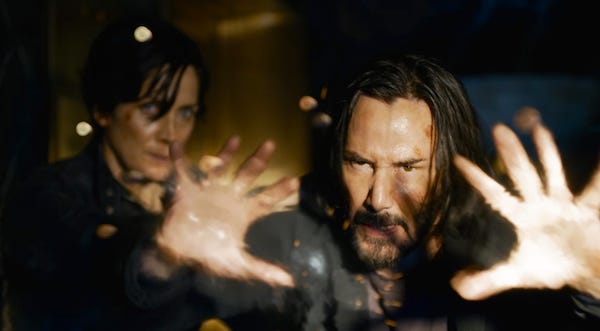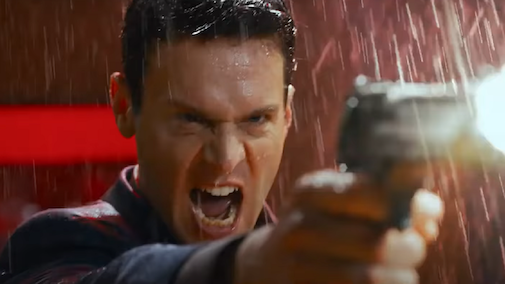by Tony Ruggio

Response to The Matrix Resurrections over the past few weeks has not been unlike response to The Last Jedi. A legion of fans loathe it for reasons of defied expectations. That's a typical response when fandom has a set idea of how a long-running tale should continue to unfold, often years later. Others love it, though, enraptured by its discursive saga and meta commentary. I fall somewhere in between, just as I did on The Last Jedi, admired and tickled by Lana Wachowski’s daring narrative excursions. She attempts to unravel and re-frame the myths and myriad cliches, but she could and should have gone even further.
The Last Jedi, for all of the belly-aching by fans, was still very much a Star Wars film beholden to black-and-white notions of good and evil, wherein the Jedi are heroes and the Sith are villains. Rian Johnson had an opportunity to dispense with such binaries and have Rey join forces with Ren to defeat both sides of the aisle. The picture waxes frequently about leaving old habits in the past, and then proceeds to follow old habits to the very end. To her credit, Lana at least one-ups that polarizing sequel by dispensing with one of the binaries central to her creation...

The great war is no longer between humans and machines, but between malevolent and benevolent machines, between wanting peace with humanity and detesting it. That being said, as screenwriter she succumbs to lazy temptation. Strip away its re-framing and reprimanding of nostalgia, and this is essentially a remake of the 1999 original, down to its final image. Some of it works, some of it doesn’t.
What definitely works is the re-framing of the franchise’s iconic villain Agent Smith, from a suit-and-tie metaphor for strict, robotic corporate hegemony to a slicker, smarmier version of it for the 21st century. Embodied by a terrific Jonathan Groff, clearly having the time of his life, Smith is both the best thing about Resurrections and the clearest sign of its integral flaws. Groff hams it up exceptionally, digging into Smith’s devilish, chaotic energy. He’s no longer a program of the Matrix but now a virus that must be controlled like humans. When Neo is freed, so is Smith, their wish for free will mirroring one another. Smith’s purpose here is indicative of the film’s biggest flaw however: Wachowski is utilizing meta humor and narrative tricks to distract from plot holes and narrative tropes. Agent Smith is a deus ex machina in the flesh, a character whose ultimate purpose is to tip the scales a bit in Neo’s favor, but not much else. There’s a perfunctory fight or two between the two sworn enemies, and then it’s off to the races attempting to subvert our expectations. The attempt is worth applauding, even if the twisting renders the Agent Smith character more pointless beyond vague ruminations on the nature of consciousness.

What makes it all worth it is Broadway star, former Mindhunter, and Frozen prince Groff’s enjoyably campy, committed performance. He so elevates the movie that he nearly made my personal Best Supporting Actor list! Even if you’re no Matrix luddite, if there’s one reason to watch Resurrections beyond its meta flights of fancy, it’s Jonathan Groff strutting around in sockless loafers and a slim-cut suit that says “screw everyone else, I’m getting mine.”
How did you respond to the divisive fourth Matrix film?